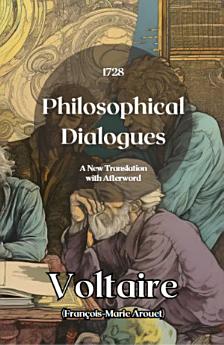Philosophical Dialogues
Mei 2024 · The complete collection of Voltaire's works Boek 1 · Minerva Heritage Press
E-boek
177
Bladsye
family_home
Geskik
info
reportGraderings en resensies word nie geverifieer nie. Kom meer te wete
Meer oor hierdie e-boek
A new translation directly from the original French manuscript of Voltaire's 1728 Philosophical Dialogues (original title "Dialogues philosophiques"). This edition also contains supplemental material on Voltaire including an afterword by the translator, a timeline of Voltaire's life and works, summaries of each of the works in his corpus, and a glossary of Philosophic terminology used by Voltaire. Voltaire wrote this during the beginning of the Enlightenment period, which was a time of seismic intellectual and philosophical change in central Europe. Philosophical Dialogues is a collection of theoretical conversations between various historical characters including Eramus, ancient philosophers, Protestant Reformers and Materialist European philosophers, in which they discuss topics such as religion, science, and morality. The work was important because it challenged traditional religious beliefs, contrasting vastly different worldviews and great thinkers, and sparked debate about the role of reason and science in society on top of the massive conflict between Protestantism and Catholicism. These dialogues are fascinating "fake" conversations between ideologies that remain tremendously relevant today.
Meer oor die skrywer
Voltaire (1694-1778), born François-Marie Arouet, was a towering figure in the European Enlightenment, renowned for his wit, satirical genius, and fierce advocacy of civil liberties, including freedom of religion and free trade. Born on November 21, 1694, in Paris, Voltaire was educated by the Jesuits at the Collège Louis-le-Grand, where he demonstrated an early talent in literature and theater. Despite a brief stint studying law, he devoted himself to writing, rapidly gaining fame for his sharp wit and eloquence. Voltaire's literary career was marked by numerous conflicts with French authorities, leading to periods of imprisonment and exile. His most famous stay at the Bastille prison was due to his satirical verse, which mocked the French Regent. This propensity for critique often saw him in conflict with the establishment, but it also earned him a reputation as a champion of the oppressed and a critic of religious and political dogma, including the Atheistic dogmatism of the French Revolution.
Gradeer hierdie e-boek
Sê vir ons wat jy dink.
Lees inligting
Slimfone en tablette
Installeer die Google Play Boeke-app vir Android en iPad/iPhone. Dit sinkroniseer outomaties met jou rekening en maak dit vir jou moontlik om aanlyn of vanlyn te lees waar jy ook al is.
Skootrekenaars en rekenaars
Jy kan jou rekenaar se webblaaier gebruik om na oudioboeke wat jy op Google Play gekoop het, te luister.
E-lesers en ander toestelle
Om op e-inktoestelle soos Kobo-e-lesers te lees, moet jy ’n lêer aflaai en dit na jou toestel toe oordra. Volg die gedetailleerde hulpsentrumaanwysings om die lêers na ondersteunde e-lesers toe oor te dra.











